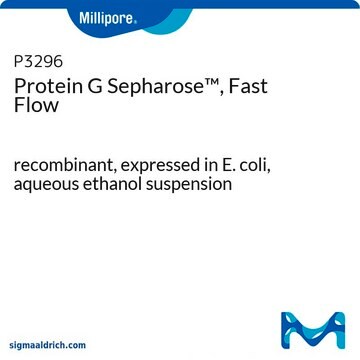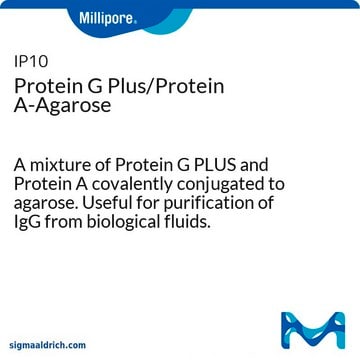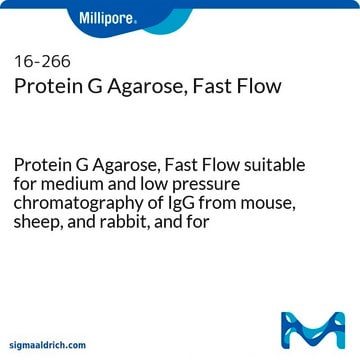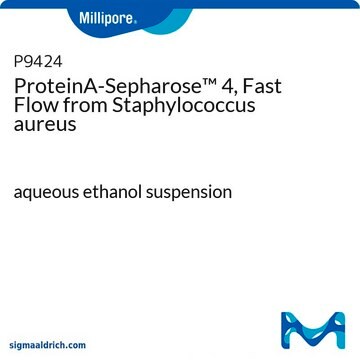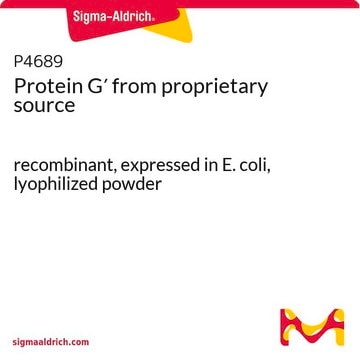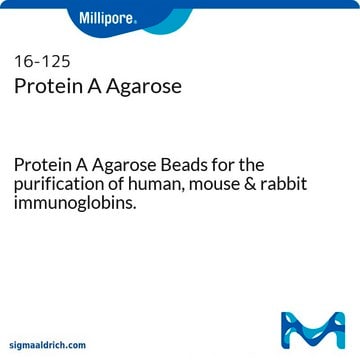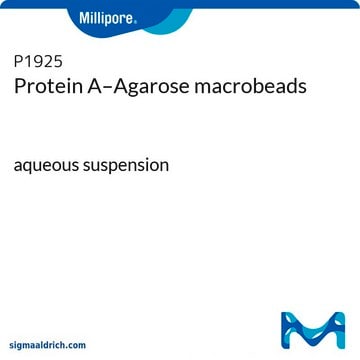P7700
Protein G–Agarose
lyophilized powder, Contains lactose stabilizers that must be removed prior to use.
Synonym(s):
Protein G resin
Sign Into View Organizational & Contract Pricing
All Photos(3)
About This Item
Recommended Products
Quality Level
form
lyophilized powder
matrix
cross-linked 4% beaded agarose
matrix activation
cyanogen bromide
matrix attachment
amino
matrix spacer
1 atom
capacity
≥15 mg/mL binding capacity (human IgG)
storage temp.
−20°C
Application
Protein G-agarose is used in affinity chromatography, protein chromatography, antibody purification and characterization, immunoaffinity matrices, protein A, G and L resins, and purification and detection. Protein G-agarose has been used to study breast cancer and falsely elevated thyroid-stimulating hormone (TSH).
Preparation Note
Prepared with a genetically engineered Protein G which retains its high affinity for IgG and lacks albumin and Fab binding sites and membrane binding regions.
Storage Class Code
11 - Combustible Solids
WGK
WGK 3
Flash Point(F)
Not applicable
Flash Point(C)
Not applicable
Personal Protective Equipment
dust mask type N95 (US), Eyeshields, Gloves
Choose from one of the most recent versions:
Certificates of Analysis (COA)
Lot/Batch Number
Don't see the Right Version?
If you require a particular version, you can look up a specific certificate by the Lot or Batch number.
Already Own This Product?
Find documentation for the products that you have recently purchased in the Document Library.
Customers Also Viewed
Ebany J Martinez-Finley et al.
Neurotoxicology and teratology, 33(5), 530-537 (2011-07-26)
Changes within the glucocorticoid receptor (GR) cellular signaling pathway were evaluated in adolescent mice exposed to 50 ppb arsenic during gestation. Previously, we reported increased basal plasma corticosterone levels, decreased hippocampal GR levels and deficits in learning and memory performance
John Collins et al.
Liver, 22(6), 501-506 (2002-11-26)
Persistent elevation of aspartate aminotransferase (AST) activity in serum due to the presence of a macroenzyme form of AST (macro-AST) may lead to diagnostic confusion in many clinical conditions, particularly those associated with chronic liver disease. We describe a case
J W Priest et al.
Molecular and biochemical parasitology, 113(1), 117-126 (2001-03-20)
Cryptosporidium parvum is a protozoan parasite of the intestinal epithelium that has caused numerous outbreaks of diarrheal illness in humans. During our studies of the host immune response to C. parvum infection, we noted that two of the immunodominant surface
Hiroshi Hirai et al.
Investigational new drugs, 29(4), 534-543 (2010-01-20)
Deregulation of cell-cycle control is a hallmark of cancer. Thus, cyclin-dependent kinases (Cdks) are an attractive target for the development of anti-cancer drugs. Here, we report the biological characterization of a highly potent pan-Cdk inhibitor with a macrocycle-quinoxalinone structure. Compound
Sergueï O Fetissov et al.
Nutrition (Burbank, Los Angeles County, Calif.), 24(4), 348-359 (2008-02-12)
Peptide hormones synthesized in gastrointestinal and adipose tissues in addition to neuropeptides regulate appetite and body weight. Previously, autoantibodies directed against melanocortin peptides were found in patients with eating disorders; however, it remains unknown whether autoantibodies directed against other appetite-regulating
Our team of scientists has experience in all areas of research including Life Science, Material Science, Chemical Synthesis, Chromatography, Analytical and many others.
Contact Technical Service
